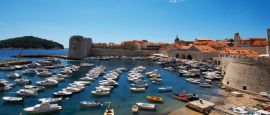Croatia: Doing business & staying in touch
Doing business in Croatia
As Croatia moves towards becoming a member of the European Union, its business etiquette and traditions are becoming more like those in the rest of the EU countries. Croatians, both male and female, tend to dress fairly smartly inland with more informality on the warmer Adriatic coast, and this more relaxed approach also extends to timekeeping.
Communication is no problem as English, Italian and German are widely used as second languages. A firm handshake is the usual start to any business meeting. Business cards including professional or academic titles should be exchanged just after formal introductions.
Interpersonal relationships are usually relaxed and develop relatively quickly, and gifts are appreciated, perhaps luxury items such as a bottle of Scottish whisky or a good bottle of Croatian wine. Alcohol, especially wine, often flows during business meals, and deals are often celebrated with hard spirits.
Along with Slovenia, Croatia was the most developed republic of the former Yugoslavia. The Croatian economy recovered well after the break-up of Yugoslavia and several years of civil war.
Industry is the most important sector in the economy, producing transport equipment (especially shipping), textiles, chemicals, processed foods and fuels. Agriculture, which produces maize, wheat, grapes and other crops, is important for domestic purposes but has never contributed significantly to the export economy. Mineral deposits of exploitable size include oil, coal and natural gas. .
Tourism is also extremely important to Croatia, and is centred on the Dalmatian coast. After being all but wiped out by the civil war, it has recovered and prospered, and is now the major driving force behind Croatia's recent economic progress. .
Annual GDP growth in 2010 was -1.4%. Inflation was around 1.3% and unemployment around 17.6%.
Keeping in Touch in Croatia
Telephone booths are operated by phonecards available at post offices, news stands and in some tourist shops. There are also payphone booths in many post offices.
Roaming agreements exist with most international mobile phone companies. Coverage is good. Local SIM cards are also readily available, often bundled with credit and a phone.
Internet cafes can be found in Zagreb and other main towns. They are easy to find (start by looking in one of the tourist agencies), though the connection speed varies.
Stamps are available in post offices and from news stands. Allow around a week for letters to the UK, 10 days to the US. See Croatian Postal Services website (www.posta.hr).
Mon-Fri 0700-1900 and Sat 0700-1300. Some may be open until 2200 in larger cities.
Croatia's media operate in a climate of relative freedom, especially compared to the restrictions of President Tudjman's era. The constitution bans censorship and guarantees press freedom. Croatian Radio-Television, HRT, is a national state-owned public broadcaster and is financed by a mixture of advertising and licence-fee revenues. Other networks include Nova and RTL. Public TV is the main source of news and information. National and regional newspapers include Jutarnji list and Večernji list; the Croatian Times (www.croatiantimes.com) is an English-language news website.
• The main daily local newspapers are Novi List (Rijeka), Slobodna Dalmacija (Split) and Vecernji List (Zagreb).
• The weekly press includes Globus and Nacional.
• There are no English-language newspapers at present.
• Croatian TV is public and operates national networks.
• RTL Televizije and Nova TV are national, private channels.








 You know where
You know where